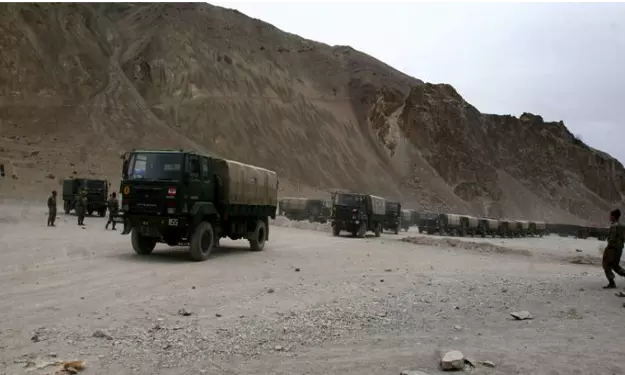
Handling the border situation
text_fieldsBJP President JP Nadda's recent comments blamed Manmohan Singh-led UPA government with a tweet that India "helplessly surrendered over 43,000 KM of Indian territory to the Chinese! During the UPA years saw abject strategic and territorial surrender without a fight". Nadda's tweet came in response to the former prime minister's severe criticism of the Modi government's failures in giving a fitting reply to Chinese adventures in the border.
The border length mentioned by Nadda appeared curious, when the distance from the northern border of India to the southern tip is only 3214 kilometers and from east to west just 2933 kilometres. But then the question how could a span of 43,000 kilometre be surrendered during Manmohan Singh's rule is one that no one can ask: one should only take everything for granted if it comes from BJP sources and is related to national security. Any one raising questions will be instantly made traitors. It is a premise of the BJP-sangh parivar school that the ownership of patriotism belongs to them. But in experience, all through their term, the country has had to face serious threats from foreign adversaries. When extremists hijacked an Indian aircraft from Kathmandu, terrorists who were in jail were escorted to Kandahar in Afghanistan and handed over to the terrorists there, and this happened while BJP was in power.
The man who had engineered this deal then, Ajit Doval is now national security adviser. Pak incursions into Kargil, the attack on parliament and the terror strikes in Pathankot and Pulwama are all events that took place during BJP regime. In other words, it is the BJP tradition to talk loud about the security of the nations and then to fail miserably on the ground.
Why would it be that whenever the BJP is in power, such big cracks happen in national security? It is only because they don't have a precise sense of direction. They see national security not as a fundamental obligation about the country, but as an emotional tactic to sideline and isolate the forces opposed to them. The campaing plank of that party is built on a narrative that Congress is a party that does not take national security seriously, Communists have been inherently anti-nationals and Muslims are internal foes of the nation.
With such a mind-set, they are used to attacking and estranging those inside the country. And that is what they focus on rather than holding in check real enemies of the country. Even when the country is facing threats, JP Nadda is finding time to use false figures and rebuke Manmohan Singh. In fact, as the president of the ruling party he is bound to rally the countrymen together at this juncture of the nation. But he is incapable of thinking along those lines, for it is in their grain to tremble before foreign foes and to label critics inside the country as internal foes and then hound the weak.
The situation is such that nobody seems to know exactly what is happening in the border. True, it is not wise to share in public every detail related to national security with countrymen. At the same time, it if comes to a state of affairs when the defence minister and foreign affairs minister say one thing, then the prime minister states quite another at the all-party meet, and when that becomes a topic of international discussion and leads to diplomatic setbacks, put a different spin to it, the impression created will be that even those in charge are entirely lost on the situation.
This confusion surrounding the Chinese issue was clear right from the beginning. When the country faces a threat, it is a cardinal duty of the government to hold countrymen together in unity. At that point, there is no ruling side and opposition. Unfortunately, the central government fails in taking the citizenry to such a united position. The ruling establishment is not able to provide clear answers to the questions raised by the Opposition. And as for the ruling party's leaders, their responses only serve to make matters worse.
There came reports the other day about China making major deployments in the border. Naturally, our side is also strengthening its defence and military machinery. At this time it is every one's responsibility to lend support to the military. For years, China has been pursuing a strategy of making major interventions in India's bordering countries in an attempt to corner India from all sides. Their major investments in Pakistan, Sri Lanka and Maldives are all part of this strategy. Most recently, China has succeeded in pitching even Nepal, which used to be an all-weather ally of India, in its camp.
One thing emerges clear from all this: border security is not a matter related to only soldiers and arms alone. But the country's security and strength are enhanced through multi-layered moves covering diplomacy, politics and economic investments. The new world order is not one where a nation can march forward merely because 'My friend Donald Trump' is with us. It is crucial to evolve a multi-pronged foreign policy with a comprehensive perspective of world politics. And that cannot be achieved through sermons or campaigns made on foreign soil.





















